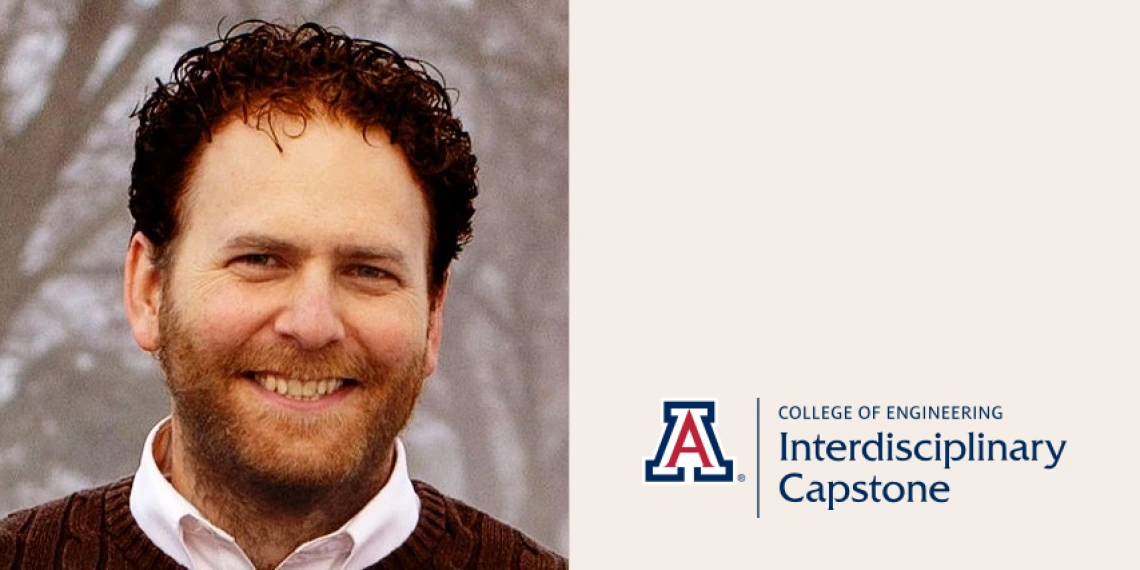From Student to Sponsor: Q&A With Matthias Whitney

Matthias Whitney earned his BS in optical engineering from the University of Arizona in 2009, and his MS in optical sciences in 2016. He currently works as an electro-optics engineer at Elbit Systems of America, which provides products and systems solutions for the defense, homeland security, commercial aviation and medical instrumentation markets. The company has been sponsoring Interdisciplinary Capstone projects since the 2018-19 academic year.
Tell us a little bit about the capstone project you did when you were a student.
My senior design project was unfortunately not a great experience due poor sponsor involvement. The sponsor seemed like he was participating in the program out of “community service” and was not personally invested in our project. Because of our good teammates who were dedicated to success, we ended up making a project that I was ultimately proud of.
Did your experience in the capstone program prepare you for your career and/or continued studies?
Yes, despite our challenges with low involvement from the sponsor, I felt there were a lot of valuable lessons that have carried over to my career. There was a lot of “meta work” to be done apart from the actual technical work that I had been a little bit blind to—things like scheduling, risk assessment, procurement and presentation. And while sometimes these tasks seemed a bit like distractions from the actual meat of the project, I have seen their applicability in my career post-university.
Your company has been sponsoring projects for several years now. How long have you personally been involved with the process?
I have been personally involved the whole time with the hope to be the sponsor that leaves the students with a good experience instead of being the MIA sponsor that doesn’t care.
What teams have you worked with? Can you tell share a little bit about the team you currently work with and how they’re doing?
Being an optical engineer, I am highly biased (perhaps to a fault) on that discipline. The projects that I have specified have been SWIR optics centric with emitters that could potentially be integrated into one of our handheld defense products while keeping the project itself non-ITAR. This year our team is building the Shortwave Transmitting Optical Beacon (STrOBe—everyone loves a good acronym). This device is intended to be a remotely controlled, standalone beacon in the shortwave infrared band, visible only to personnel with specialized night vision equipment, that can be deployed with human throw or perhaps a drop from a drone and always land emitters side up.
This project presents several challenges across the engineering disciplines of mechanical, electrical, software, and of course, optics. Because of the onset of COVID-19 during the 2019-2020 school year, our team last year came up with some excellent ideas but failed to execute in the end. We have reused the same project for the 2020-2021 school year, and I’ve been pleasantly surprised to see a unique set of very clever solutions from this year’s team. I’m looking forward to seeing how the project comes together in the integration phase.
What are some of the most rewarding moments?
I am highly impressed at the professionalism of the students during their design review presentations. Seeing their diligence as the ideas mature into a reality is very fulfilling. From a recruiting standpoint, it is also rewarding to see the name recognition of our company increase because of exposure from the senior design program. I also participate in other recruiting events like the Industrial Affiliates Showcase put on by the James C. Wyant College of Optical Sciences.
Would you recommend the sponsor experience to other companies and alumni?
Yes with the caveat that they need to be prepared to dedicate some meaningful resources in order to specify a project with the correct scope – difficult enough to keep the students interested but small enough to fit within a eight month design-to-prototype cycle – and also to support their team on an ongoing basis.

